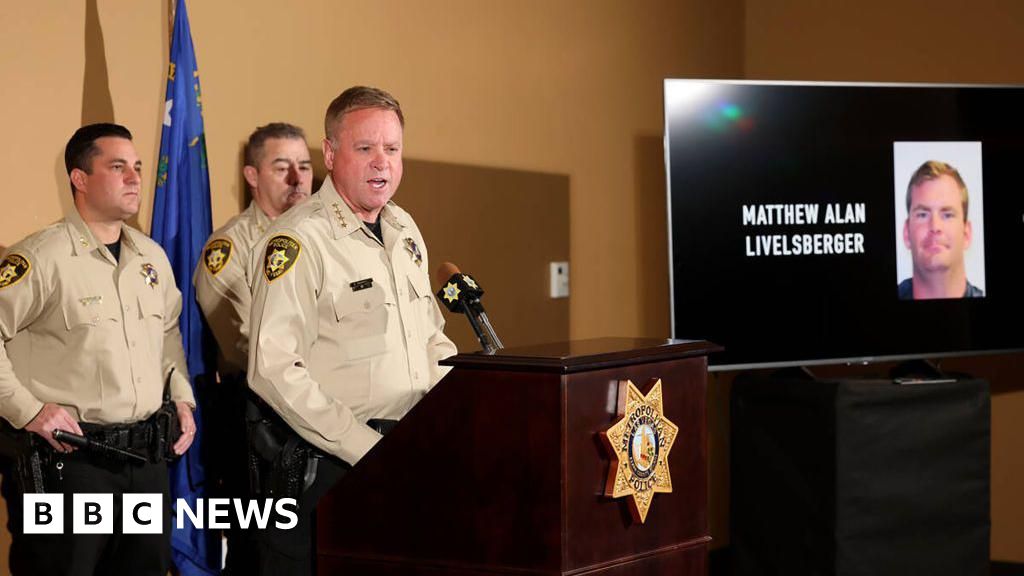The man identified inside the Tesla Cybertruck that exploded outside the Trump Hotel in Las Vegas on Wednesday morning had no animosity toward President-elect Donald Trump and likely suffered from post-traumatic stress disorder, according to the FBI.
Matthew Livelsberger, an active-duty US army member from Colorado who was found deceased inside the vehicle, also grappled with other family issues or personal grievances, FBI officials said.
Officials also emphasised the deadly truck attack in New Orleans that left 14 dead earlier on New Year’s Day was unrelated to the explosion in Las Vegas.
Police said the Las Vegas blast appeared to be a “tragic case of suicide”.
“There is no evidence that these two events are connected,” Las Vegas FBI agent Spencer Evans told reporters on Friday as officials laid out new information on the incident.
“Investigative steps have discovered, and information of the Army indicates, that he likely suffered from PTSD, and we’re also aware that there were potential other family issues or personal grievances in his own life that may have been contributing factors,” Mr Evans said.
Data uncovered from Mr Livelsberger’s phone, including a series of notes he appeared to have written, suggest that the 37-year-old suffered from PTSD related to his time in combat, officials said.
His body was found inside the charred Tesla, which exploded from fireworks that Mr Livelsberger had purchased on his way to Las Vegas from Colorado.
Mr Livelsberger’s identity had been confirmed via a DNA sample that authorities obtained from a family member.
Police said he also appeared to have suffered a self-inflicted gunshot wound.
In the digital notes recovered by police, Livelsberger also mentioned political grievances, calling on his fellow Army officers to criticise military leadership.
In another note, police said he specifically wrote that the incident was “not a terrorist attack” but a “wake-up call”.
Mr Livelsberger was a decorated Special Forces intelligence sergeant who was serving in Germany, but was on approved leave at the time of the blast.
His father told BBC’s US partner CBS News that his son was in Colorado to see his wife and eight-month-old daughter.
He said he last spoke to his son at Christmas and nothing seemed out of the ordinary.
Mr Livelsberger’s ex-girlfriend told the Washington Post that he had once told her he suffered a traumatic brain injury during his overseas deployment. Alicia Arritt, a 39-year-old nurse who dated Mr Livelsberger on and off from 2018 to 2021, said he admitted to struggling with memory, concentration and intense guilt over his actions on the battlefield.
The Daily Beast reported that Mr Livelsberger was a big supporter of Trump. A senior law enforcement official who spoke with Mr Livelsberger’s family told the outlet that he voted for Trump in November’s election.
Police had been able to track his movements in the days leading up to the incident thanks to surveillance cameras and other data obtained from the Tesla vehicle itself.
They said that Mr Livelsberger had rented the Tesla Cybertruck from a mobile application called Turo in Colorado on 28 December, and had driven it more than 800 miles to Las Vegas. He also legally purchased two firearms during that period, which were recovered inside the car.
Sheriff Kevin McMahill with the Las Vegas Police Department said authorities have not determined why Mr Livelsberger chose the site outside the Trump Hotel for the scene of the explosion, but added that evidence suggests it was one of multiple locations he had considered.
Seven people suffered minor injuries from the blast. All have since been released from hospital, Sheriff McMahill said.
He added that the investigation remains ongoing, and that police “are barely scratching the surface” of data they have recovered from the man’s devices.
If you have been affected by any of the issues raised in this story you can visit BBC Action Line. Help and support outside the UK can be found at Befrienders Worldwide or you can call the US Suicide and Crisis Lifeline on 988.


